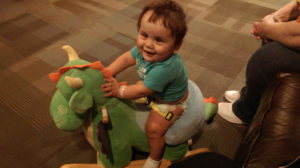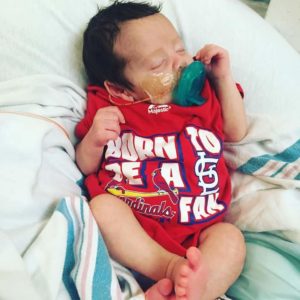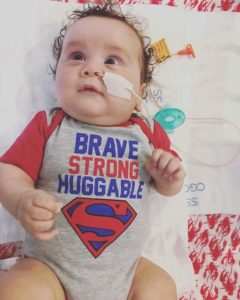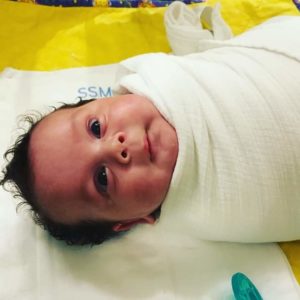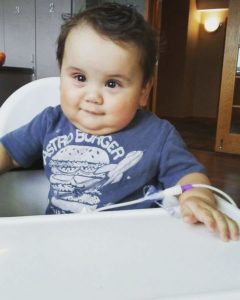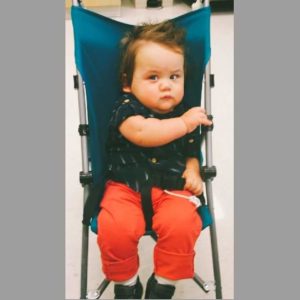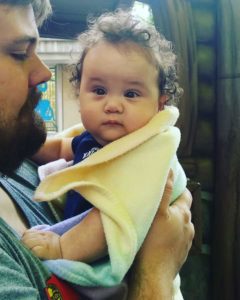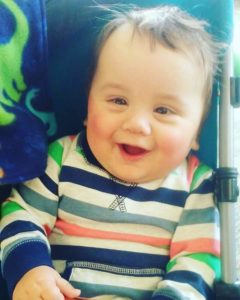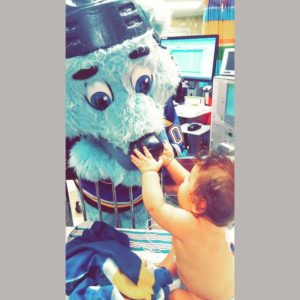Our Patients:
Henry Walker
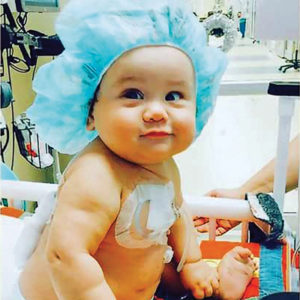
Henry’s mother Leticia was at a routine 20-week ultrasound when her obstetrician informed her that she had abnormally low amount of amniotic fluid, and that her growing baby’s kidneys AND bladder were significantly inflamed. She was quickly referred from her hometown doctor’s office in Carbondale, IL to the St. Louis Fetal Care Institute (FCI) at SSM Health Cardinal Glennon Children’s Hospital.
“Best case scenario was that my baby had a lower urinary tract obstruction which would clear itself when he urinated right after birth. Worst case scenario was that my baby would need dialysis and a kidney transplant,” Leticia recalls. The roadmap of pregnancy and “life” was significantly altered with this unknown, and Leticia and Henry (as she named him) started preparing as best they could.
At 35 weeks in her pregnancy, Leticia’s water broke and she traveled to SSM Health St. Mary’s Hospital. She delivered Henry on March 4, 2017 and two days later, as he was monitored in the NICU at SSM Health St. Mary’s, Henry’s blood creatinine and electrolytes were at panic levels. It was now necessary to transfer Henry to SSM Health Cardinal Glennon where he could have the evaluation and management from the pediatric neonatology and nephrology experts.
Within the first two weeks of Henry’s life, the seriousness of his condition unfolded. Neonatologist Dr. Farouk Sadiq and Nephrologist Dr. Craig Belsha were two of Henry’s significant caregivers handling the task of figuring out Henry’s next steps and explaining it all to Leticia. “Henry’s right kidney did not work at all, and his left kidney had little to no function either. They diagnosed him with end stage renal disease, and told me he needed to start dialysis with an eventual kidney transplant,” said Leticia.
At 2 weeks old, Henry had a peritoneal dialysis catheter placed and he began his dialysis treatments at 4 weeks old with a goal to be able to do his treatments at home back in Carbondale. Henry had both kidneys removed at 5 months old and continued peritoneal dialysis for the next several months. Leticia made her home in the NICU while her other daughter (then 2 years old) remained back home with extended family in Carbondale. “The social workers and Footprints team have been an incredible support to me. They provided gas cards, grocery cards, and things that made it possible for me to keep going,” Leticia says.
At 9 months of age, Henry was transferred to the Transitional Care Unit with the plans for Leticia to take him home. Unfortunately, Henry developed an umbilical hernia, which led into his peritoneal catheter tunnel. His catheter then failed multiple times, which meant Henry would need to switch from peritoneal dialysis treatments to hemodialysis treatments. Hemodialysis would require Henry to be at the hospital for dialysis treatments four days a week for five hours each day. The travel back and forth from Carbondale to St. Louis (107 miles one-way) for Henry’s treatments would not be manageable over any significant length of time.
Leticia left her full time job and home back in Carbondale and brought her daughter to St. Louis, enrolling her in a local preschool and depleting her savings to make “life” work. Henry was finally discharged after 9 months in the hospital and they have been living at the Ronald McDonald house since then. On top of Henry’s multiple treatments every week at the hospital, he also has appointments with multiple other subspecialty services like Endocrinology, Immunology, Urology, General Surgery, Cardiology, Ophthalmology, Physical Therapy, Speech Therapy and the Complex Medical Care Team.
“The plan now is to strengthen Henry’s immune system and for him to grow to about 80 cm. Then, if he meets all of the criteria, he can be listed for a kidney transplant,” says Leticia. “We have no idea when that time will come. But he’s such a happy little guy despite all he’s been through.”
“I never expected that I would face life having to choose whether to put food on the table or buy medicine for my child. Or, pay for a utility bill vs. afford gas to get back and forth from the hospital. It’s really devastating and a huge worry on top of what’s going on with your child,” says Leticia. “The staff here have gone to bat for us…helping us with food, diapers, housing, Social Security and Disability…all things that have kept us afloat.”
On March 4, Henry and his family were thrilled to celebrate his first birthday! They honored Henry’s journey and those of other children battling kidney disease by attending the National Kidney Foundation kidney walk in St. Louis, followed by a family birthday party.
Leticia commented, “No one tells you how you will get back to a ‘normal’ life after you go through all of this. But for now I am just so grateful he’s a happy boy, and for the support we’ve received that is made possible from the generosity of so many others.”
